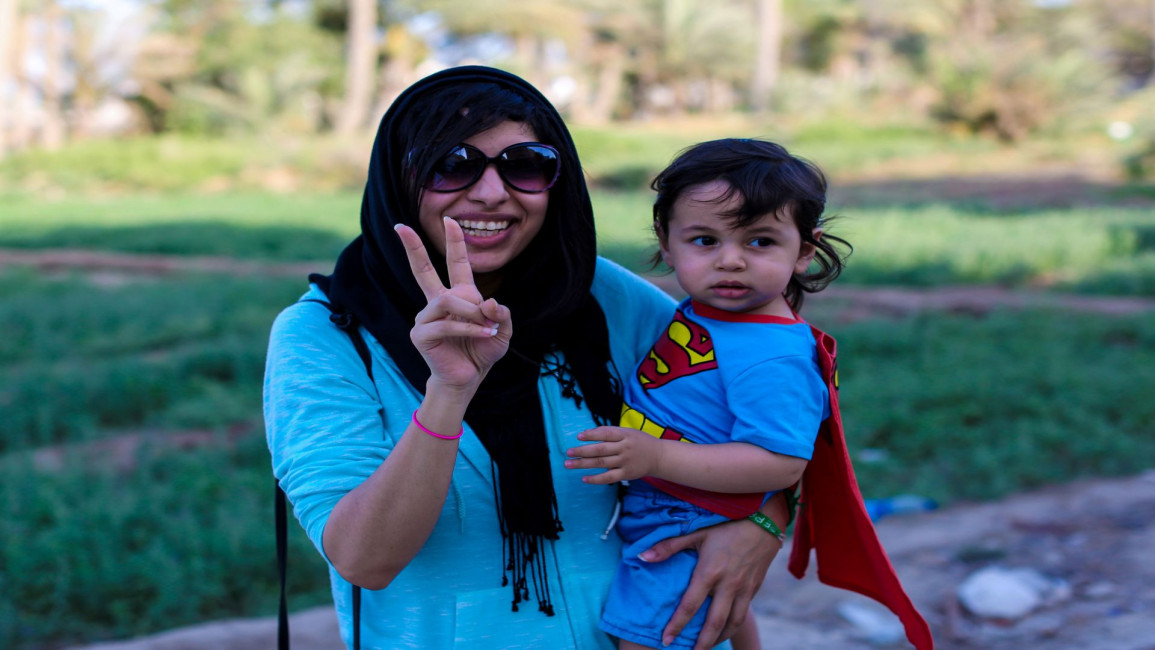Bahrain releases prominent activist Zainab al-Khawaja and her child
Bahraini authorities on Tuesday released opposition activist Zainab al-Khawaja on "humanitarian" grounds, after she had been imprisoned with her toddler son since March, a public prosecution official said.
The Bahraini rights activist, who also holds Danish nationality, had been convicted of insulting King Hamad by ripping up a picture of him, and had chosen to keep her 17-month-old son with her in jail.
Judicial authorities ordered "the suspension of the sentence" for Khawaja and another defendant identified as Irena Bogotova who had been jailed with her four-year-old son, First Advocate-General at the Public Prosecution Abdulrahman al-Sayed said in a statement.
They were released "considering their humanitarian situation and in the interests of their children," he said.
Bogotova is reportedly Russian, but no details have been given about her case.
Zainab al-Khawaja is the daughter of prominent rights activist Abdulhadi al-Khawaja, who is serving a life sentence for "plotting to overthrow" the Bahraini regime.
The Gulf Centre for Human Rights (GCHR) said Khawaja was jailed for three years and one month on charges including tearing up the monarch's picture and insulting a police officer.
Khawaja has been arrested and released from jail several times since December 2011. She has previously spent almost a year and a half in prison.
Her sister Maryam, co-director of the GCHR, confirmed on Twitter that Khawaja "is officially out and on her way home to her (other) children".
The foreign ministry said earlier in May that Khawaja would be freed with another foreigner for "humanitarian" reasons, adding that their release was the result of a follow-up into the situation of inmates with foreign citizenship held in criminal cases.
 |
If the Bahraini government is interested in serious reform it will immediately organise a mass release of political prisoners. - Brian Dooley, Human Rights First |
 |
Foreign Minister Sheikh Khalid bin Ahmed Al-Khalifa said during a press briefing with visiting US Secretary of State John Kerry in April that Khawaja would go home.
Brian Dooley of the Washington-based Human Rights First said in a statement that "while it is better that" Khawaja and her son "are out of rather than in prison, this is no major breakthrough for human rights, (and) no indicator of fundamental reform".
"If the Bahraini government is interested in serious reform it will immediately organise a mass release of political prisoners," he said.
Dozens of activists are serving lengthy jail terms, including Sheikh Ali Salman - the leader of Bahrain's main opposition bloc Al-Wefaq.
An appeals court on Monday increased his jail term on charges of inciting violence to nine years from the original four, a judicial official said.
 |
Dozens of activists are serving lengthy jail terms, including Sheikh Ali Salman |  |
Human rights group Amnesty International issued a statement denouncing the verdict as "clearly" politically motivated.
"Salman's conviction is clearly politically motivated and is designed to send a message to others that even legitimate and peaceful demands for reform will not go unpunished," said James Lynch, deputy director of Amnesty's Middle East and North Africa programme.
"He is a prisoner of conscience and should never have been put on trial in the first place. He must be immediately and unconditionally released," Lynch said in a statement.
Bahrain is the only Shia-majority country in the Gulf. The Shia on the island have been objecting to discrimination against them by the Sunni monarchy and calling for democratic reforms.
An Arab Spring inspired popular uprising in February 2011 was crushed by the government with the help of troops sent from the UAE and Saudi Arabia. There have been dozens of deaths and more than 2,000 arrests since the protests began.
The tiny but strategic kingdom is an important Western ally and home to the US Navy's Fifth Fleet.



